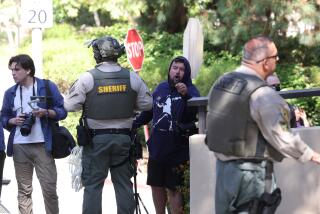District Is Opposed to Its Breakup : Schools: Officials formally register their position against Assemblywoman Boland’s bill to dismantle the L.A. Unified system.
Calling it mean-spirited and arbitrary, Los Angeles school officials on Monday formally voted to oppose a bill aimed at dismantling the school district, saying it singled out the massive system without regard to student achievement.
But while the board opposed the bill, authored by state Assemblywoman Paula Boland, (R-Granada Hills), members agreed to support another measure sponsored by state Sen. Tom Hayden, (D-Los Angeles) that would essentially require any breakup plan to maintain existing court orders and federal and state laws currently followed by Los Angeles Unified.
The bills are linked, however, meaning Hayden’s bill would not go into effect unless the Boland measure was signed into law. As a result, the school board’s support for Hayden rang hollow to Boland.
“I don’t know who they think they’re fooling--the public’s not that stupid,” said Boland, who did not attend the Monday afternoon school board meeting. “It’s like me handing you a double-dip ice cream cone and saying, ‘I’m giving this to you because I love you,’ but knowing the doctor said it could kill you. This way they get some good publicity while knowing that his bill will go nowhere without mine.”
The school board essentially followed the recommendations of Supt. Sid Thompson, who had earlier urged members to support the Hayden legislation with some amendments and oppose the Boland bill unless it was dramatically altered.
Under Boland’s bill, the number of voters’ signatures required to get a breakup plan on the ballot would be reduced from 25% to 8% and the Los Angeles school board would no longer have veto power over such a plan.
Hayden’s legislation requires any new districts to incorporate existing court orders and laws over such things as desegregation and socioeconomic diversity.
Board members did agree, however, to urge Hayden to amend his bill to require that any new districts be geographically contiguous as well as compact. Board member Julie Korenstein said new districts should be next to each other so that “districts don’t include schools in Chatsworth and San Pedro.”
But Sandy Brown, Hayden’s chief of staff in Los Angeles who attended the meeting, said she is unsure whether that suggestion would be included in the legislation. “It isn’t necessarily true that if something’s next to you, it’s better,” Brown said. “I’m not certain, for example, that all magnet schools couldn’t make one district.”
Board members appeared to be concerned, however, about a controversial proposal currently being floated in the district that would establish a separate school system composed of the campuses operating under the LEARN reform program.
If the board’s suggestion was adopted by Hayden, a LEARN district would be banned because the schools are spread throughout the 708-square-mile district.
But while board members and Supt. Thompson acknowledged that they would consider legislation to reduce the size of the district and increase student achievement, they said Boland’s bill was unacceptable.
“One of these (bills) seems, well, mean-spirited,” Thompson said, referring to Boland’s bill. “It seems to be, ‘Well, let’s get the Los Angeles Unified School District.’ ”
Several board members said Boland’s legislation should be broadened to include all school districts and school boards--and not just Los Angeles. “All school districts should be treated equally,” Korenstein said. “It’s only focused and targeted on L.A. Unified.”
By focusing on Los Angeles Unified, board President Mark Slavkin said Boland was trying to score “political points.”
“To single out this school district and only one school district to me is very arbitrary . . . and posturing,” Slavkin said.
The board took the unusual step of reviewing the legislation during its regular meeting as part of a new strategy aimed at letting the public and the district’s lobbyists understand members’ positions on major--and controversial--legislation.
While previous legislation to break up the district--the largest in the state--have largely been unsuccessful, both legislators say they stand a better chance now with the more conservative climate in Sacramento. A hearing on the legislation has tentatively been scheduled for early April in Sacramento.
But while some school board members said they would examine more specific legislation, they said ultimately they wish the issue would die.
“I think this issue . . . has been around far too long,” said board member Leticia Quezada. “In my dreams, we would leave this battle and philosophical debate behind us and we could really concentrate on student outcomes.”
More to Read
Start your day right
Sign up for Essential California for news, features and recommendations from the L.A. Times and beyond in your inbox six days a week.
You may occasionally receive promotional content from the Los Angeles Times.






